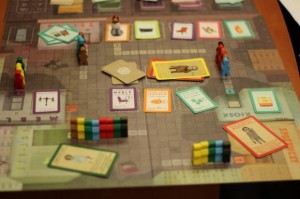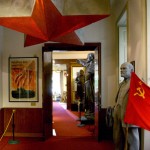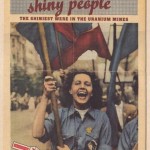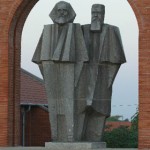If you ask school kids today what’s their least favorite subject, they often reply, “History.” Maybe they need a new teacher, because history can be packaged in a way that makes it fun to learn.
 A friend sent me a link to a Polish game that teaches history. Sensing a need for the younger generation to learn about the realities of life under Communism, Poland’s Institute of National Remembrance created a game to depict the lines Poles waited in for hours to buy the most basic of supplies. The game is called “Kolejka” which means Queue. (In Romania, the word was “coadă.”)
A friend sent me a link to a Polish game that teaches history. Sensing a need for the younger generation to learn about the realities of life under Communism, Poland’s Institute of National Remembrance created a game to depict the lines Poles waited in for hours to buy the most basic of supplies. The game is called “Kolejka” which means Queue. (In Romania, the word was “coadă.”)
It sold out the first day it went on sale.
 When Steve and I toured Central Europe two years ago, we saw those same teaching principles applied in three capital cities of the former Eastern Bloc. By poking fun at the ineptitude of the former regimes, they taught what life was like in the “old days” to not only their own children, but also to international tourists.
When Steve and I toured Central Europe two years ago, we saw those same teaching principles applied in three capital cities of the former Eastern Bloc. By poking fun at the ineptitude of the former regimes, they taught what life was like in the “old days” to not only their own children, but also to international tourists. 
In Prague, Czech Republic, we visited The Museum of Communism by following posters with Lenin pointing the way above the Imperalist McDonald’s. The museum housed empty store shelves and a secret police interrogation room.
Near my former apartment in  Budapest, Hungary, all the old statues of Stalin and Lenin have been collected in a spot called Statue (Memento) Park. It includes a phone booth (the Communist Hotline) with a red phone and a photo of Brezhnev wearing swim trunks.
Budapest, Hungary, all the old statues of Stalin and Lenin have been collected in a spot called Statue (Memento) Park. It includes a phone booth (the Communist Hotline) with a red phone and a photo of Brezhnev wearing swim trunks.
Probably the city with the biggest sense of humor seemed to be Berlin, Germany. Fake guards pose for photos  with tourists at famous sites like Checkpoint Charlie and the Brandenburg Gate. Rental car companies had Trabants (Trabis) for hire.
with tourists at famous sites like Checkpoint Charlie and the Brandenburg Gate. Rental car companies had Trabants (Trabis) for hire.
Of course, the reality of life in those days was far from humorous. How can we ever make light of Auschwitz or a Siberian labor camp? But certain things, especially in hindsight, can be seen in a comical light. (Think Hogan’s Heroes portraying Nazi guards as buffoons.)
If it helps people learn what life was really like, then it’s a good thing. And maybe, just maybe, we’ll learn from the mistakes of history. And stop repeating them.